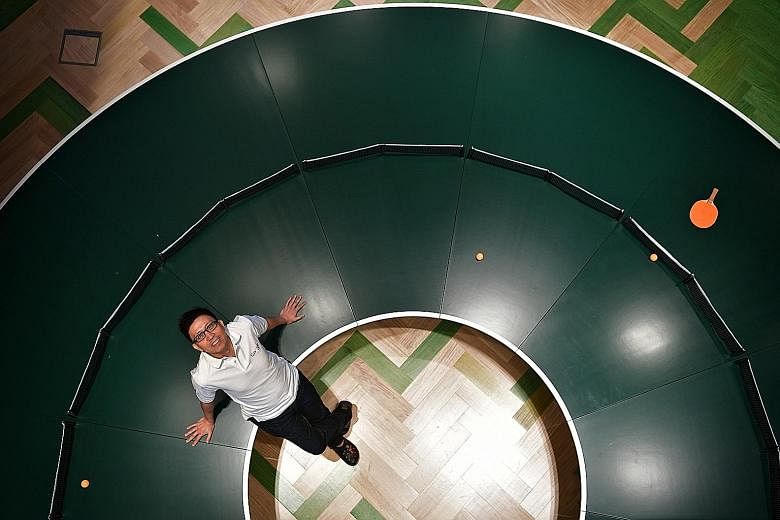It can be said that Mr Lim Jing Yee is to Google what high-tech boffin Q is to fictional British secret service agent James Bond.
Q is behind most of Bond's gadgets - from poison darts-filled wrist guns to pistols with palm print readers - that moviegoers have come to associate with the 007 movies.
Similarly, Mr Lim, 46, has engineered one of the biggest tech inventions, Gmail, now synonymous with the company he has worked in for almost 15 years.
The webmail service, in which the Singaporean owns 16 patents, has captured more than one billion active users around the world.
He is now on a new mission: to allow people to speak to a computer like they are having a natural conversation with a real person.
Together with a handful of engineers here and in Mountain View, California, his goal is to develop better algorithms for Google Assistant, a virtual personal assistant.
This is to allow Google to learn and better understand users' intentions when they say things like "lunch nearby" or "my photos of London" to their Google Pixel phone or the new messaging app Allo. Google Assistant will eventually be embedded in the firm's other products.
The larger goal is to reach the next billion Internet users who may not be tech-savvy or literate. There are an estimated 3.5 billion Internet users worldwide today.
"Just like in Star Trek where people speak to machines, speech is a more natural way of communication than typing," said the soft-spoken software engineer, who has since 2008 been based in Singapore.
"Voice-activated personal assistants are also a good tool to bridge the digital divide."
Speaking to The Straits Times at Google's new office in Mapletree Business City II in Pasir Panjang, he noted that there are many possibilities in this emerging speech-to-text space. "Who knows, digital assistants may detect shock in one's voice or facial expression and automatically translate that to a text message with bigger font sizes."
Mr Lim pioneered the concept of clustering e-mails of the same thread into a conversation - a breakthrough design that makes it easier for users to find their e-mails.
Known as "conversation view" - a patent registered under his name in the United States - the feature was rolled out with the launch of Gmail in April 2004, when he was based in Mountain View.
Then, Gmail also offered generous storage space of 1GB for free to users when its rival Hotmail was giving only 2MB without a fee.
"The webmail offerings were not very exciting at that time," he said.
But, today, Google Assistant is up against prominent rivals like Apple's Siri, Microsoft's Cortana and Amazon's Alexa, and emerging ones like Chinese search giant Baidu's Little Fish.
Even so, Mr Lim is not new to challenges having navigated the regional differences in addressing and road naming when he helped to roll out Google Maps in South-east Asia in 2008.
In India and Japan, for instance, some roads do not have names and numbers in addresses may not be set up in a sequence.
To help users get from point A to point B, Google Maps has to use landmarks for navigation.
He returned to Singapore that year with his wife, who was expecting their third child, and two young children - after spending close to two decades in Silicon Valley.
"When the opportunity arose to launch Google Maps for the region in Singapore, I quickly volunteered," he said, noting he needed "better childcare support" from his parents and parents-in-law here.
He had worked in consumer electronics firm Thomson Electronics and search engine firm Excite in Silicon Valley before becoming a "Googler" in 2002.
What sparked his interest in computer science was a $5,000 made-in-Japan NEC computer his father bought in 1982 when he was just 12.
And this resulted in hours of poring over a programming manual that came with the computer, which later led to small victories in the form of a basic calculator software and a Pac-Man-like computer game he created.
His older brother, who is now working as a software engineer in Silicon Valley, was also bitten by the same bug.
Asked if his three children - aged eight, 10 and 12 - display any inclination towards hard sciences, his reply was: "They all seem to like maths."
But he believes in granting them the freedom to explore which he was given by his parents.
He is heartened by the changing mindset towards engineering as a career, with giants like Google and Amazon hiring here.
Still, his advice to young people is not to take up a job just because it pays well.
"No matter what career path you take, you should follow your passion."


